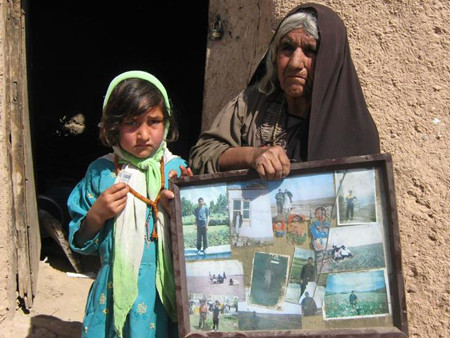More than 1,000 people were killed in the first six months of 2009, according to a UN report.

Nine-year-old Zahra was orphaned after coalition forces bombed her village in a remote area of western Afghanistan last year. The attack killed 90 people, 60 of them children. She was crying a lot; she knew that her father, mother, and brother were gone. (Photo: RFE/RL)
The UN blamed insurgents for using increasingly deadly modes of attack. It also said air strikes by government-allied forces were responsible.
There has been widespread concern in Afghanistan about civilian death tolls.
In June the US military called for better training in an effort to reduce the numbers of civilian deaths.
Gen Stanley McChrystal, the new commander of US and Nato-led troops in Afghanistan, has said troops must make protecting Afghan civilians a priority.
And the Taliban also issued a new code of conduct earlier this week which says fighters should minimise civilian casualties.
But the UN warned more civilians may be killed in the coming weeks as militants fight back against a major offensive by US forces ahead of key elections next month.
Civilian targets
The report, by the UN Assistance Mission in Afghanistan (Unama), says insurgents were responsible for more deaths than government-allied forces.
But it also notes that two-thirds of the deaths caused by government-allied forces came in air strikes.
The rising death toll was partly due to the fact that militants were deliberately basing themselves in residential districts, the report's authors concluded.
The increasingly sophisticated tactics used by insurgents were also highlighted.
There has been a particular rise in co-ordinated attacks, the report says - using suicide bombers and explosives to target government offices.
In those attacks, civilians were always singled out and killed.
In the most recent of these attacks, gunmen and suicide bombers targeted Gardez and Jalalabad in eastern Afghanistan, killing five people.
Presidential elections
The report also noted that militants increasingly bombed the cars of civilians who work with government or international troops.
Shops selling music and goods deemed to be "immoral" have also been increasingly targeted.
Civilian deaths rose every month this year compared with 2008, except for February. May was cited as the deadliest month, with 261 civilians killed.
The BBC's David Loyn, in Kabul, says that even the large increase recorded by the UN is likely to be an underestimate, as many deaths are not counted.
The importance of the report lies in the upward trend, our correspondent says.
This is the third year the UN has counted civilian deaths and the numbers have risen each year.
Elections are due to take place amid tight security on 20 August, when President Hamid Karzai is hoping to secure a second term.
However, in the past week alone there have been two attacks on Afghan election campaigns.
On Tuesday a campaign manager for presidential candidate Abdullah Abdullah was wounded when his vehicle was attacked in Laghman province.
Two days earlier there was an assassination attempt on Mohammed Qasim Fahim, a running mate of Mr Karzai.



